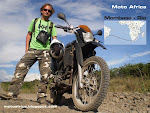It was already dark yesterday when Alfred drove me with safari company's jeep to the
neighbouring lodge to withdraw money from my maestro card. That was
the only way how to pay my safari trip to Etosha as I don't carry so much cash in my
pocket everyday here in Africa. You know, 'they' might rob you. :)
Alfred is 34 and is a safari guide. He was born in Etosha.
His mother and his sister still live here, his father runs a cattle and goat
farm 80 kms away.
As Alfred noticed I will do camping and as he knew I cant do it close to the lodge, he told me his uncle is camping nearby. He's name is Boy and is a road worker. They are camping with other road workers just 20 kms away, next to the road of course.
It was dark night already when I found the workers. They were sitting around the fire. I said hello and told them that Alfred is my friend. They welcomed me to stay with them. I pitched my tent, put my Chalaka can into
the fire and we had a nice little chat about life and lots of laughs.
Later during the night I watched namibian stars again and listened
to some music from my iphone. In early morning (4am) it is getting pretty chilly outhere, anyway
it's winter time here in Namibia. :) One hour before sunrise I've heard one of the workers came
out of the tent and I saw he started a fire. Thank you man, it was freezing already. :) Brand new
day in front of me, what a feeling! :)
Btw.
Etosha is 100 and some years old national park. I call it big zoo as it is big as my country Slovenia. They don't let motorbikers in so I had to find another
solution how to get in. I did it with a neighbouring lodge's safari drive.
Inside of the park I saw many very loud cars and trucks (more than on the main road), packed
with tourists, some of them equipped like Rambos with all those huge almost one meter long photo
objectives. Animals don't even pay attention to cars and people anymore. We saw girrafes,
elephants, zebras, kudus, springboks, rabbits, you name it.
My impression about national (game) parks in Africa again and again repeats. I mean I like the idea of national
parks in general, how it was at the beginning. But how it turned out after so many years, I don't like national parks anymore. It's turning to another big industry, destroying more than rescuing. It's similar than charity with no idea if it helps or spoils.
.JPG) |
| Milk at petrol station in Oshivelo |
 |
Drinking up the Oshivelo
cattle milk |
.JPG) |
| Turn to Etosha park |
.JPG) |
| Alfred driving |
.JPG) |
| View from our safari vehicle |
.JPG) |
| Somebody's sleeping |
.JPG) |
| Morning next to the road |
.JPG) |
Hansie, Rice, Oupit, Rubben
& Boy
|
.JPG) |
| With Rice & Oupit |
.JPG) |
| Oupit, me, Rubben & Boy |
.JPG) |
| Position of my tent |
.JPG) |
'Rice' with my guitalele
in the morning |
.JPG) |
| Tsumeb town |
.JPG) |
It looks meteorites fall down
often around here |
.JPG)
.JPG)
.JPG)
.JPG)

.JPG)
.png)
.JPG)
.JPG)
.JPG)
.JPG)
.JPG)
.JPG)
.JPG)
.JPG)
.JPG)
.JPG)
.JPG)
.JPG)
.JPG)
.JPG)
.JPG)
.JPG)
.JPG)
.JPG)
.JPG)
.JPG)
.JPG)
.JPG)
.JPG)
.JPG)
.JPG)
.JPG)
.JPG)
.JPG)
.JPG)
.JPG)
.JPG)
.JPG)
.JPG)
.JPG)
.JPG)
.JPG)
.JPG)
.JPG)
.JPG)

.JPG)
.JPG)
.JPG)
.JPG)
.JPG)
.JPG)
.JPG)
.JPG)
.JPG)
.JPG)
.JPG)
.JPG)

